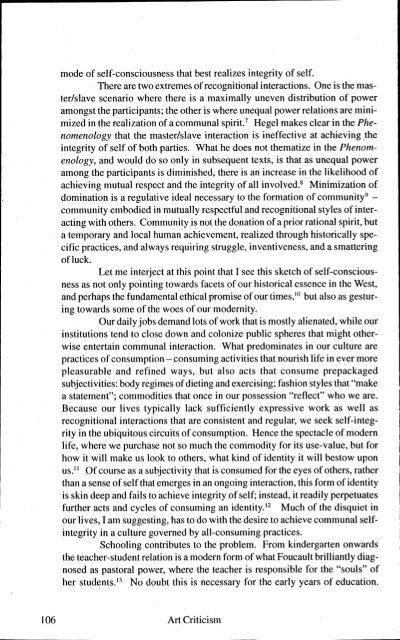Art Criticism - The State University of New York
Art Criticism - The State University of New York
Art Criticism - The State University of New York
Create successful ePaper yourself
Turn your PDF publications into a flip-book with our unique Google optimized e-Paper software.
mode <strong>of</strong> self-consciousness that best realizes integrity <strong>of</strong> self.<br />
<strong>The</strong>re are two extremes <strong>of</strong> recognitional interactions. One is the mas~<br />
ter/slave scenario where there is a maximally uneven distribution <strong>of</strong> power<br />
amongst the participants; the other is where unequal power relations are minimized<br />
in the realization <strong>of</strong> a communal spirit. 7 Hegel makes clear in the Phenomenology<br />
that the master/slave interaction is ineffective at achieving .the<br />
integrity <strong>of</strong> self <strong>of</strong> both parties. What he does not thematize in the Phenomenology,<br />
and would do so only in subsequent texts, is that as unequal power<br />
among the participants is diminished, there is an increase in the likelihood <strong>of</strong><br />
achieving mutual respect and the integrity <strong>of</strong> all involved. 8 Minimization <strong>of</strong><br />
domination is a regulative ideal necessary to the formation <strong>of</strong> community9 -<br />
community embodied in mutually respectful and recognitional styles <strong>of</strong> interacting<br />
with others. Community is not the donation <strong>of</strong> a prior rational spirit, but<br />
a temporary and local human achievement, realized through historically specific<br />
practices, and always requiring struggle, inventiveness, and a smattering<br />
<strong>of</strong>luck.<br />
Let me interject at this point that I see this sketch <strong>of</strong> self-consciousness<br />
as not only pointing towards facets <strong>of</strong> our historical essence in the West,<br />
and perhaps the fundamental ethical promise <strong>of</strong> our times,1O but also as gesturing<br />
towards some <strong>of</strong> the woes <strong>of</strong> our modernity.<br />
Our daily jobs demand lots <strong>of</strong> work that is mostly alienated, while our<br />
institutions tend to close down and colonize public spheres that might otherwise<br />
entertain communal interaction. What predominates in our culture are<br />
practices <strong>of</strong> consumption - consuming activities that nourish life in ever more<br />
pleasurable and refined ways, but also acts that consume prepackaged<br />
subjectivities: body regimes <strong>of</strong> dieting and exercising; fashion styles that "make<br />
a statement"; commodities that once in our possession "reflect" who we are.<br />
Because our lives typically lack sufficiently expressive work as well as<br />
recognitional interactions that are consistent and regular, we seek self-integrity<br />
in the ubiquitous circuits <strong>of</strong> consumptjon. Hence the spectacle <strong>of</strong> modern<br />
life, where we purchase not so much the commodity for its use-value, but for<br />
how it will make us look to others, what kind <strong>of</strong> identity it will bestow upon<br />
us. 1I Of course as a subjectivity that is consumed for the eyes <strong>of</strong> others, rather<br />
than a sense <strong>of</strong> self that emerges in an ongoing interaction, this form <strong>of</strong> identity<br />
is skin deep and fails to achieve integrity <strong>of</strong> self; instead, it readily perpetuates<br />
further acts and cycles <strong>of</strong> consuming an identity. 12 Much <strong>of</strong> the disquiet in<br />
our lives, I am suggesting, has to do with the desire to achieve communal selfintegrity<br />
in a culture governed by all-consuming practices.<br />
Schooling contributes to the problem. From kindergarten onwards<br />
the teacher-student relation is a modern form <strong>of</strong> what Foucault brilliantly diagnosed<br />
as pastoral power, where the teacher is responsible for the "souls" <strong>of</strong><br />
her students. 13 No doubt this is necessary for the early years <strong>of</strong> education.<br />
106<br />
<strong>Art</strong> <strong>Criticism</strong>
















